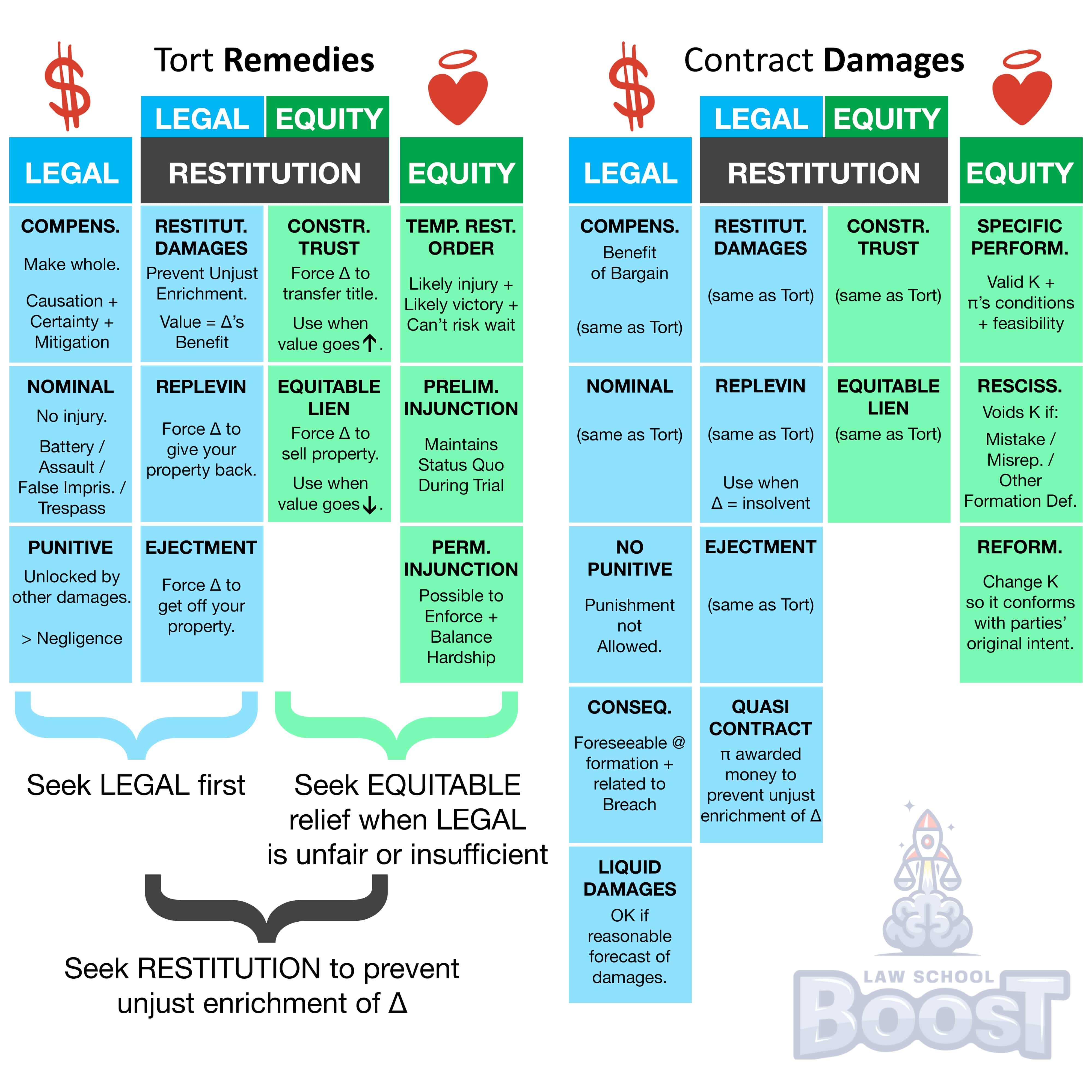🏥
Remedies • Contract - Legal Remedies
REM#039
Legal Definition
To prove damages, there must be (1) causation; (2) foreseeability; (3) certainty; and (4) unavoidability.
Plain English Explanation
To get money (damages) because someone broke a contract with you, you have to prove four things:
Causation: The person's actions directly caused your loss.
Foreseeability: It was predictable that breaking the contract would cause this kind of harm.
Certainty: You can clearly show how much you lost.
Unavoidability: You tried your best to limit your losses or couldn't have avoided them.
This rule is there to make sure that only genuine and reasonable claims get compensated. It ensures that someone can't just claim any random loss after a contract is broken.
Causation: The person's actions directly caused your loss.
Foreseeability: It was predictable that breaking the contract would cause this kind of harm.
Certainty: You can clearly show how much you lost.
Unavoidability: You tried your best to limit your losses or couldn't have avoided them.
This rule is there to make sure that only genuine and reasonable claims get compensated. It ensures that someone can't just claim any random loss after a contract is broken.
Hypothetical
Hypo 1: Bob agrees to deliver 100 apples to Sam's store by Monday. Bob delivers them on Wednesday. Because of this delay, Sam couldn't fulfill a big order and lost a customer. Result: Sam can claim damages if he proves causation (Bob's late delivery caused the loss), foreseeability (Bob could predict that being late would harm Sam's business), certainty (Sam can show the exact amount he lost from the missed sale), and unavoidability (Sam couldn't get apples from elsewhere on short notice).
Hypo 2: Bob agrees to paint Sam's office blue. Bob paints it green. Sam claims he lost a big advertising deal because of the wrong color. Result: Sam might struggle with foreseeability. It's not obvious that painting an office the wrong color would lead to a lost advertising deal. Unless Sam had informed Bob about the deal and the importance of the color, he might not get damages for that specific loss.
Hypo 3: Bob agrees to cater Sam's wedding with a specific menu. On the day, Bob brings a completely different menu. Many guests have dietary restrictions and can't eat the food. Sam had to order emergency pizzas. Result: Sam can claim damages by proving causation (Bob's wrong menu led to the issue), foreseeability (Bob should have known the importance of the agreed menu for a wedding), certainty (Sam can show the exact cost of the emergency pizzas), and unavoidability (Sam had no choice but to order something else on short notice).
Hypo 4: Bob rents out his beach house to Sam for a week. When Sam arrives, he finds that there's no running water. Sam claims he had to cancel a photoshoot he planned at the house because of this. Result: While Sam can prove causation (no water caused the cancellation) and unavoidability (he couldn't have done the photoshoot without water), he might struggle with foreseeability unless he had informed Bob about the photoshoot and the importance of running water for it.
Hypo 2: Bob agrees to paint Sam's office blue. Bob paints it green. Sam claims he lost a big advertising deal because of the wrong color. Result: Sam might struggle with foreseeability. It's not obvious that painting an office the wrong color would lead to a lost advertising deal. Unless Sam had informed Bob about the deal and the importance of the color, he might not get damages for that specific loss.
Hypo 3: Bob agrees to cater Sam's wedding with a specific menu. On the day, Bob brings a completely different menu. Many guests have dietary restrictions and can't eat the food. Sam had to order emergency pizzas. Result: Sam can claim damages by proving causation (Bob's wrong menu led to the issue), foreseeability (Bob should have known the importance of the agreed menu for a wedding), certainty (Sam can show the exact cost of the emergency pizzas), and unavoidability (Sam had no choice but to order something else on short notice).
Hypo 4: Bob rents out his beach house to Sam for a week. When Sam arrives, he finds that there's no running water. Sam claims he had to cancel a photoshoot he planned at the house because of this. Result: While Sam can prove causation (no water caused the cancellation) and unavoidability (he couldn't have done the photoshoot without water), he might struggle with foreseeability unless he had informed Bob about the photoshoot and the importance of running water for it.
Visual Aids

Related Concepts
In assessing contract legal remedies, are nominal damages permitted?
In assessing contract legal remedies, are punitive damages permitted?
In assessing contract legal remedies, what are compensatory damages?
In assessing contract legal remedies, what are consequential damages?
In assessing contract legal remedies, what are expectation damages?
In assessing contract legal remedies, what are incidental damages?
In assessing contract legal remedies, what are liquidated damages and when are they permissible?
What are legal remedies in contract?
What is the result of having a liquidated damages provision that is too excessive?


